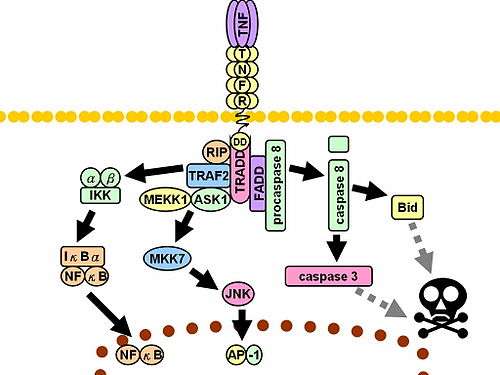CD120
| tumor necrosis factor receptor superfamily, member 1A | |
|---|---|
| Identifiers | |
| Symbol | TNFRSF1A |
| Alt. symbols | CD120a, TNFR1 |
| Entrez | 7132 |
| HUGO | 11916 |
| OMIM | 191190 |
| RefSeq | NM_001065 |
| UniProt | P19438 |
| Other data | |
| Locus | Chr. 12 p13.2 |
| tumor necrosis factor receptor superfamily, member 1B | |
|---|---|
| Identifiers | |
| Symbol | TNFRSF1B |
| Alt. symbols | CD120a, TNFR2 |
| Entrez | 7133 |
| HUGO | 11917 |
| OMIM | 191191 |
| RefSeq | NM_001066 |
| UniProt | P20333 |
| Other data | |
| Locus | Chr. 1 p36.22 |
CD120 (Cluster of Differentiation 120) can refer to two members of the tumor necrosis factor receptor superfamily: tumor necrosis factor receptor 1 (TNFR1) and tumor necrosis factor receptor 2 (TNFR2).[1][2]
Receptor subtypes
There are two variants of the receptor, each encoded by a separate gene:
- CD120a - TNFR1 - TNFR superfamily member 1A
- CD120b - TNFR2 - TNFR superfamily member 1B
TNFR1 is the receptor type responsible for mediation of TNF-alpha induced sickness behavior,[3] and is involved in neurotoxic processes.[4] Elevated levels of TNFR1 has been found in severe mental disorders.[5]
Signaling pathway

Signaling pathway of TNF-R1. Dashed grey lines represent multiple steps
See also
References
- ↑ Locksley RM, Killeen N, Lenardo MJ (2001). "The TNF and TNF receptor superfamilies: integrating mammalian biology". Cell. 104 (4): 487–501. doi:10.1016/S0092-8674(01)00237-9. PMID 11239407.
- ↑ Hehlgans T, Pfeffer K (2005). "The intriguing biology of the tumour necrosis factor/tumour necrosis factor receptor superfamily: players, rules and the games". Immunology. 115 (1): 1–20. doi:10.1111/j.1365-2567.2005.02143.x. PMC 1782125
 . PMID 15819693.
. PMID 15819693. - ↑ Palin K, Bluthé RM, McCusker RH, Levade T, Moos F, Dantzer R, Kelley KW (January 2009). "The type 1 TNF receptor and its associated adapter protein, FAN, are required for TNFalpha-induced sickness behavior". Psychopharmacology (Berl.). 201 (4): 549–56. doi:10.1007/s00213-008-1331-4. PMC 2711641
 . PMID 18825372.
. PMID 18825372. - ↑ McCoy MK, Tansey MG (2008). "TNF signaling inhibition in the CNS: implications for normal brain function and neurodegenerative disease". J Neuroinflammation. 5 (1): 45. doi:10.1186/1742-2094-5-45. PMC 2577641
 . PMID 18925972.
. PMID 18925972. - ↑ Hope S, Melle I, Aukrust P, Steen NE, Birkenaes AB, Lorentzen S, Agartz I, Ueland T, Andreassen OA (November 2009). "Similar immune profile in bipolar disorder and schizophrenia: selective increase in soluble tumor necrosis factor receptor I and von Willebrand factor". Bipolar Disord. 11 (7): 726–34. doi:10.1111/j.1399-5618.2009.00757.x. PMID 19839997.
External links
- CD120a Antigen at the US National Library of Medicine Medical Subject Headings (MeSH)
- CD120b Antigen at the US National Library of Medicine Medical Subject Headings (MeSH)
This article is issued from Wikipedia - version of the 5/28/2016. The text is available under the Creative Commons Attribution/Share Alike but additional terms may apply for the media files.